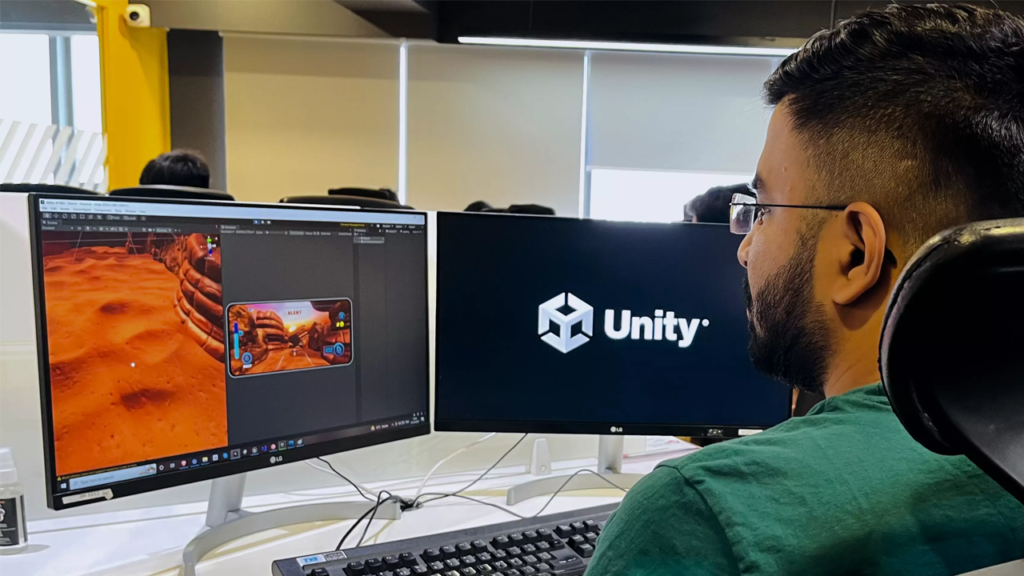Choosing the best programming language for game development can feel like navigating through an intricate maze, with each turn presenting a new set of challenges and opportunities. Whether you’re a budding developer dreaming of creating the next blockbuster game or a seasoned programmer looking to sharpen your skills, understanding the landscape of game development languages is crucial. In this exploration, we’ll dive into the factors that make a programming language stand out in the realm of game creation, guiding you toward making an informed decision for your next project.
Exploring the Best Programming Language for Game Development
Choosing the best programming language for game development is a pivotal decision that can shape the future of a project. While there is no one-size-fits-all answer, certain languages have carved out a niche for themselves in the gaming industry. C++, for instance, is renowned for its power and control over system resources, making it a popular choice for high-performance games. On the other hand, Python offers simplicity and readability, appealing to beginners and those focused on rapid development.
Unity and Unreal Engine have democratized game development, making it accessible to a wider audience. Unity uses C# as its primary programming language, which strikes a balance between simplicity and the robust capabilities needed for game development. Unreal Engine utilizes C++, providing developers with the tools to squeeze every ounce of performance from their hardware. However, for mobile game developers, Java and Swift may be more pertinent, given their role as the primary languages for Android and iOS development, respectively.
Ultimately, the choice of programming language depends on the project’s specific needs, the team’s expertise, and the target platform. Whether aiming for the flexibility of Python or the performance of C++, developers must weigh their options carefully. Nevertheless, learning multiple languages and understanding their unique advantages can open up a broader range of possibilities in game development.
| Language | Advantages | Popular Use Cases |
|---|---|---|
| C++ | High performance, control over hardware | AAA Games |
| Python | Easy to learn, rapid development | Indie Games, Prototyping |
| C# | Balance of simplicity and power, strong community | Unity Games |
| Java | Portability, robust libraries | Mobile Games |
| Swift | Native performance, safety features | iOS Games |
When contemplating the vast landscape of game development, it’s clear that the choice of programming language is more than a mere preference—it’s a strategic decision that influences not just the development process but the final product’s performance and reception. As the industry evolves, so too do the languages and technologies that underpin it, underscoring the importance of staying informed and adaptable. By understanding the strengths and weaknesses of each language, developers can better align their projects with the appropriate tools and frameworks, ensuring a smoother development process and a more engaging gaming experience.
Deciphering the Best Programming Language for Game Development

The quest for the best programming language for game development is akin to seeking the Holy Grail in the realm of video game creation. It’s a complex question, as the answer hinges on various factors including the developer’s proficiency, the game’s platform, and the specific requirements of the game itself. Among the myriad of programming languages, C++, C#, and Python stand out as popular choices, each with its unique strengths and applications in the gaming industry.
C++ is often heralded as the powerhouse language for game development, primarily due to its unparalleled performance and control over system resources. It’s the backbone of many AAA titles and game engines, such as Unreal Engine. On the other hand, C# boasts a more straightforward syntax and is the language of choice for Unity, another leading game engine that supports both indie developers and large studios. Python, while not as performance-intensive as C++, offers simplicity and rapid development capabilities, making it ideal for scripting and prototype development.
Choosing the right programming language is crucial, as it not only affects the development process but also the final game’s performance and scalability. Developers must weigh the pros and cons of each language, considering factors like the game’s complexity, platform compatibility, and development timeline. Ultimately, the “best” language is one that aligns with the project’s specific needs and the team’s expertise.
- C++ for performance-intensive games
- C# for Unity-based games
- Python for scripting and prototyping
- JavaScript for web-based games
- Java for cross-platform mobile games
Further Insights on Game Development Languages
In the ever-evolving landscape of game development, staying informed about the latest programming languages and tools is paramount. Beyond the primary languages of C++, C#, and Python, emerging technologies and platforms continually influence the choice of programming languages. For instance, the rise of virtual reality (VR) and augmented reality (AR) games has seen an increased demand for languages capable of handling immersive experiences. Moreover, the game development community plays a crucial role in shaping these trends, offering a wealth of resources, forums, and tutorials that guide developers in making informed decisions. As the industry progresses, the dialogue around programming languages continues to expand, reflecting the dynamic nature of game development.
C++: The Industry Standard
When it comes to game development, C++ is often hailed as the industry standard. This programming language has been at the core of creating some of the most complex and visually stunning games in the market. Its unparalleled performance and the fine control it offers over system resources make C++ the go-to language for developers aiming to push the boundaries of game technology. Furthermore, C++’s compatibility with game engines like Unreal Engine solidifies its place as a foundational tool in a developer’s arsenal.
One of the key reasons C++ is favored among game developers is its ability to handle resource-intensive applications without compromising on speed or efficiency. This is particularly crucial in game development, where real-time performance and quick response times can make or break the gaming experience. Additionally, C++ offers a level of flexibility and control that is unmatched by higher-level languages, allowing developers to optimize their code for various hardware specifications. This makes C++ an indispensable language for creating games that are both complex and accessible across different platforms.
Further Insights into C++’s Dominance in Game Development
Delving deeper into the significance of C++ in game development, it becomes clear that its dominance is not just about technical capabilities. The vast ecosystem of libraries and tools available to C++ developers is a treasure trove that enhances productivity and innovation. From graphics libraries like OpenGL and DirectX to comprehensive game development frameworks, C++ offers a mature environment for developers to bring their creative visions to life.
Why C++ Continues to Reign Supreme
Despite the emergence of new programming languages and technologies, C++ continues to reign supreme in the realm of game development. Its continued relevance is a testament to the language’s adaptability and the active community of developers who contribute to its evolution. As game technology advances, C++ evolves to meet the ever-changing demands of the industry, ensuring that it remains an indispensable tool for developers aiming to create the next generation of games.
- Unmatched performance and efficiency
- Direct control over hardware resources
- Compatibility with leading game engines
- Access to a vast ecosystem of libraries and tools
- A supportive and active developer community
Python: Rapid Prototyping Power
In the realm of game development, Python stands out for its exceptional efficiency and ease of use, making it a favorite among developers for rapid prototyping. This programming language allows creators to quickly bring their ideas to life, thanks to its readable syntax and vast libraries that reduce the amount of code required to create complex functionalities. Python’s versatility enables developers to experiment with game mechanics and features swiftly, significantly speeding up the development cycle.
Moreover, Python’s supportive community and plethora of development tools make it an even more appealing choice for game prototyping. From powerful frameworks like Pygame to advanced libraries for artificial intelligence and machine learning, Python equips developers with the resources they need to push the boundaries of game development. Although it may not be the primary language used for final game builds, especially in performance-intensive titles, its role in the initial stages of game design and development is undeniable.
Why Python Reigns Supreme in Prototyping

Python’s dominance in the prototyping phase of game development can be attributed to its simplicity and the high productivity it offers. Its syntax is intuitive, making it accessible for beginners, yet powerful enough for experienced programmers to efficiently tackle complex problems. The ability to prototype rapidly with Python allows developers to fail fast, learn quickly, and iterate more effectively, leading to more innovative and polished games.
| Feature | Benefit | Example Use |
|---|---|---|
| Readable Syntax | Speeds up development | Quick iteration of game loops |
| Vast Libraries | Reduces need for custom code | AI and machine learning integration |
| Community Support | Access to resources and troubleshooting | Development tool recommendations |
| Framework Availability | Facilitates game creation | Using Pygame for game mechanics |
| Prototyping Speed | Allows for rapid testing and iteration | Experimenting with game features |
Deep Dive: The Prototyping Advantage with Python
Exploring further into Python’s prototyping capabilities reveals its unmatched power in transforming ideas into playable prototypes swiftly. This advantage not only streamlines the development process but also fosters a culture of innovation within development teams. By leveraging Python’s rapid prototyping power, game developers can explore more creative avenues without the constraints of more cumbersome languages, ultimately leading to richer and more engaging gaming experiences.
Java: Cross-Platform Compatibility
When considering the best programming language for game development, Java’s cross-platform compatibility stands out as a significant advantage. This feature allows developers to write code once and run it on any device that supports Java, without the need for modifications. This is particularly beneficial in the gaming industry, where games are often released across multiple platforms, including Windows, macOS, Linux, and various mobile operating systems. Java achieves this through the Java Virtual Machine (JVM), which serves as an intermediary layer between the code and the hardware, ensuring that Java applications can run on any device with a JVM implementation.
Moreover, Java’s robust set of libraries and frameworks, such as LibGDX and JMonkeyEngine, provides developers with powerful tools for creating complex games. These libraries offer functionalities for graphics rendering, physics, and network play, among others, simplifying the game development process. Additionally, Java’s strong community support and extensive documentation further ease the learning curve for beginners and provide valuable resources for troubleshooting and enhancing game development projects.
Advantages of Java in Game Development
While Java may not be the first language that comes to mind for game development, its benefits, particularly in terms of cross-platform compatibility, make it a worthy consideration. This capability, combined with Java’s performance and stability, enables developers to create high-quality games that reach a wider audience. Furthermore, Java’s object-oriented programming nature facilitates organized and modular code, essential for managing complex game projects.
- Write-once, run-anywhere capability
- Rich set of libraries and frameworks for game development
- Strong community support and extensive documentation
- Facilitates organized and modular code through object-oriented programming
- High performance and stability for game development
C#: Unity’s Preferred Language
In the realm of game development, selecting the right programming language is a pivotal decision that can significantly impact the development process and the final product. Among the plethora of options, C# holds a distinguished position, especially when it comes to developing games with Unity. Unity is a powerful and widely used game engine that provides developers with an extensive set of tools for creating both 2D and 3D games. The engine’s preference for C# is not arbitrary but grounded in the language’s ability to offer a balance between ease of use and the capability to write efficient and high-performing code.
C# is a high-level programming language that combines the robustness of C++ with the simplicity of Visual Basic. This blend makes it incredibly accessible for beginners, while still being powerful enough for experienced programmers to take full advantage of Unity’s features. The language’s strong type-checking, array bounds checking, and automatic garbage collection are just a few features that help in minimizing common programming errors, making the game development process smoother and more efficient. Additionally, C#’s integration within the Unity editor facilitates a seamless workflow, allowing developers to write, debug, and test their code efficiently within a unified environment.
Furthermore, the extensive documentation and active community support surrounding C# and Unity contribute significantly to easing the learning curve for new developers. This support network enables the quick resolution of problems and provides a wealth of shared knowledge and resources, which can be invaluable in game development projects.
| Feature | Benefit | Relevance to Game Development |
|---|---|---|
| Strong Type-Checking | Reduces bugs related to type errors | Increases code reliability and stability |
| Array Bounds Checking | Prevents overflow and underflow errors | Enhances security and performance |
| Automatic Garbage Collection | Simplifies memory management | Improves game performance and resource utilization |
| Integration with Unity Editor | Streamlines development workflow | Enables rapid prototyping and testing |
| Community Support | Access to a vast knowledge base and resources | Facilitates learning and problem-solving |
JavaScript: For Web-Based Games
When it comes to developing web-based games, JavaScript stands out as a premier choice for developers. Its ubiquity in web browsers ensures that games built with JavaScript can be played on virtually any device without the need for additional plugins or software installations. This language offers a blend of flexibility, ease of use, and widespread support that makes it ideal for creating interactive and engaging online games. Furthermore, JavaScript’s compatibility with HTML5 and CSS3 allows for the creation of visually stunning and responsive gaming experiences that can captivate players across different platforms.
One of the key advantages of using JavaScript for game development is its event-driven nature, which is perfect for handling in-game actions and animations. Coupled with powerful libraries and frameworks such as Three.js for 3D games or Phaser for 2D games, developers can significantly reduce development time and focus on enhancing the game’s features and user experience. Moreover, the community around JavaScript is vast and active, providing an abundance of resources, tutorials, and tools that can help both novice and experienced game developers.
Despite its many benefits, it’s important to note that JavaScript games are generally more suited for lighter, casual gaming experiences rather than complex, high-performance games that may require the capabilities of native applications. However, for developers looking to quickly prototype ideas or create games that are easily accessible across a wide range of devices, JavaScript is an unbeatable option.
Fueling Innovation with JavaScript Game Development
The landscape of web-based game development is constantly evolving, with JavaScript at the forefront of this transformation. Developers are continually pushing the boundaries of what’s possible, creating games that offer deeper narratives, more complex gameplay mechanics, and richer multiplayer experiences. This innovation is partly fueled by the advancements in web technologies, including WebAssembly and WebGL, which allow JavaScript games to achieve near-native performance and graphics. Such developments are making web-based games increasingly indistinguishable from their desktop counterparts, signaling a bright future for JavaScript game development.
Advancements in JavaScript Game Development Tools
In the realm of JavaScript game development, the tools and frameworks available are becoming more sophisticated, enabling developers to build more complex and high-quality games. These advancements not only streamline the development process but also open up new possibilities for game design and interaction.
| Tool/Framework | Use Case | Key Feature |
|---|---|---|
| Phaser | 2D game development | Fast rendering |
| Three.js | 3D game development | WebGL integration |
| Babylon.js | Rich interactive 3D games | Powerful physics engine |
| CreateJS | HTML5 Games | Modular libraries |
| PlayCanvas | Real-time collaboration | Cloud-based editor |
In conclusion, JavaScript’s role in game development, particularly for web-based games, cannot be overstated. Its ability to create accessible, engaging, and visually appealing games makes it a go-to choice for developers. The continuous advancements in web technologies and development tools further enhance its capabilities, ensuring that JavaScript remains at the cutting edge of online game development. As the community and technology continue to evolve, we can expect to see even more innovative and captivating games being developed using JavaScript.

Is a game developer and writer with over seven years of experience in the gaming industry. Specializing in game design, development trends, and emerging technologies. He has worked on indie game projects and larger development teams, sharing his insights to help aspiring developers navigate the evolving world of game creation. Ethan’s articles focus on practical tips, game mechanics, and tools to inspire creativity in the gaming community.






